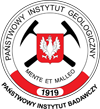Polish Geological Survey: mission and goals
-
The new
Geological and Mining Law dated 9
th June 2011, which comes into force on 1
st January 2012, delegated the responsibility of the Polish Geological Survey to the Polish Geological Institute – National Research Institute. In accordance with article 162, position 1 of the Geological and Mining Law, the Polish Geological Survey is responsible for the following to:
- initiate, coordinate and carry out research to improve the understanding of the geology of the country, including areas of primary importance for the national economy, in particular discovering new mineral deposits, estimating mineral resources and reserves, and protecting the environment;
- runs the Central Geological Archive;
- gather, provide access to, process and store geological data;
- manage geological databases;
- prepare the balance of mineral resources in Poland;
- prepare materials for auctions of hydrocarbon exploration and prospecting as well as for hydrocarbon production licences;
- coordinate and carry out geological mapping as well as pilot projects in that field;
- manage the Register of Mining Areas;
- coordinate actions taken to conserve geodiversity and to coordinate environmental geology projects;
- investigate and monitor geological hazards.
The overriding objective of the Polish Geological Survey is to look after the sustainable development of the country's mineral resources and geological heritage, particularly through practising, coordinating and promoting programmes which rationally manage and conserve the mineral resources in Poland. The Polish Geological Survey fulfils this mission by undertaking new challenges and solving problems which are relevant for the public benefit as well as the development of Polish geology as a scientific discipline. In terms of the energy security of the country, the Geological Survey studies geological conditions favourable for the presence of hydrocarbons as well as their production from conventional and unconventional reservoirs, including shale and tight gas. The potential of using hot-dry-rock (HDR) geothermal energy is also investigated. The Geological Survey carries out exploration programmes targeting formations and structures for safe CO
2 storage together with their monitoring. Programmes related to geo-environmental hazards carried out involve investigating contaminated areas as well as areas of mass wasting within the framework of the Landslide Counteracting System (LCS). The Polish Geological Survey also promotes conservation of the abiotic environment and geotourism. Its operation complies with the key strategies of the country such as the Environmental Policy of the Country or the project Poland 2030.
Apart from tasks set by the Geological and Mining Law Act, the Polish Geological Survey carries out projects commissioned by the Ministry of the Environment as well as departments. It cooperates with government administration, local governments, geological, exploration, mining and other companies, scientific research institutions, and surveys both national and foreign. Since 2011, the Polish Geological Survey cooperates with Geocentrum Polska, a scientific and industry association gathering leading scientific organizations in the field of Polish geology as well as companies focused on extraction and processing of mineral resources. The organization was initiated by the Polish Geological Institute – National Research Institute, which remains its leader.
The Polish Geological Institute – National Research Institute, acting as the Polish Geological Survey, is a member of EuroGeoSurveys, an organization which gathers the European geological surveys.



